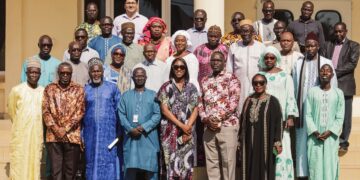In a renewed push to transform agricultural education into a strategic driver of food security and youth empowerment, the Federal Government has inaugurated a 24-member Inter-Ministerial Technical Working Committee to overhaul agriculture-related curricula in Nigeria’s tertiary institutions.
The inauguration ceremony, held at the Federal Ministry of Education headquarters in Abuja, was presided over by the Honourable Minister of Education, Dr. Maruf Tunji Alausa, who described the initiative as a “bold step” toward closing the gap between Nigeria’s agricultural potential and its current performance.
“Our Colleges and Universities of Agriculture should be the engines of food security,” Dr. Alausa declared. “But what we see today is a gap between potential and performance, largely due to outdated curricula. This committee has a unique opportunity to correct that trajectory.”
The newly formed committee comprises stakeholders from universities, polytechnics, colleges of education, agricultural research institutes, private sector representatives, and farmers’ associations. Their core mandate is to modernize the existing agricultural curricula in alignment with national priorities, emerging technologies, and industry demands.
Dr. Alausa further disclosed that the Ministry is finalizing a master plan to utilize the vast farmlands in tertiary institutions through partnerships with private investors. The plan aims to convert these idle lands into vibrant hubs for food production and hands-on student training.
“We’re committed to turning idle acres into innovation hubs,” the Minister said. “Students will no longer graduate with just theoretical knowledge—they will acquire practical skills, confidence, and the entrepreneurial mindset to lead in agro-based industries.”
The inauguration is part of the Ministry’s broader strategy to reposition vocational and technical education across the country. Dr. Alausa referenced the Ministry’s recently launched TVET Data Dashboard, which recorded over 1.3 million registrants in just 10 days. Notably, agriculture ranked among the top two preferred skills, with more than 210,000 applicants choosing livestock farming.
“This data confirms that young Nigerians are interested in agriculture. We must seize this momentum,” Dr. Alausa added.
The committee has been tasked with identifying all agriculture-related programmes offered across tertiary institutions, reviewing the age and relevance of current curricula, evaluating curriculum development processes, and assessing the financial and logistical implications of a nationwide overhaul. Members are also expected to propose actionable recommendations to guide sustainable reforms.
Prof. Idris Bugaje, Executive Secretary of the National Board for Technical Education (NBTE), responded on behalf of the committee, assuring the Ministry of their commitment to deliver a detailed, forward-thinking report within six weeks.
“We are deeply passionate about repositioning agricultural education,” said Prof. Bugaje. “Our goal is to embed real skills, adopt modern techniques, and make agriculture appealing to young people. We want our graduates to be confident, employable, and proud of their training.”
The inauguration of this committee aligns with President Bola Ahmed Tinubu’s Renewed Hope Agenda, which emphasizes food security, youth employment, and innovation as key pillars of national development.
This landmark initiative signals a strong political will to transform agricultural education into a cornerstone of Nigeria’s economic revival.
– ENDS –



















































































 EduTimes Africa, a product of Education Times Africa, is a magazine publication that aims to lend its support to close the yawning gap in Africa's educational development.
EduTimes Africa, a product of Education Times Africa, is a magazine publication that aims to lend its support to close the yawning gap in Africa's educational development.